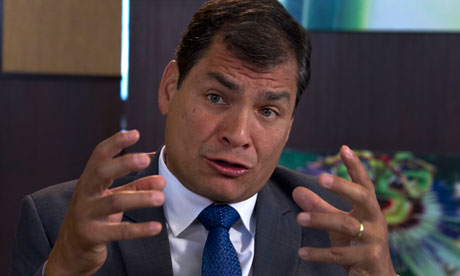Rafael Correa not considering Snowden asylum: helping him was a 'mistake'
Ecuador's president reveals travel pass was granted 'without authorisation' and says whistleblower is now Russia's problem
Rory Carroll in Quito, guardian.co.uk,Tuesday 2 July 2013 02.44 BST, Source

Ecuador's president Rafael Correa said Snowden 'must be on Ecuadorean territory' to make an asylum request. Photograph: Martin Mejia/AP
Ecuador is not considering Edward Snowden's asylum request and never intended to facilitate his flight from Hong Kong, president Rafael Correa said as the whistleblower made a personal plea to Quito for his case to be heard.
Snowden was Russia's responsibility and would have to reach Ecuadorean territory before the country would consider any asylum request, the president said in an interview with the Guardian on Monday.
"Are we responsible for getting him to Ecuador? It's not logical. The country that has to give him a safe conduct document is Russia."
The president, speaking at the presidential palace in Quito, said his government did not intentionally help Snowden travel from Hong Kong to Moscow with a temporary travel pass. "It was a mistake on our part," he added.
Asked if he thought the former NSA contractor would ever make it to Quito, he replied: "Mr Snowden's situation is very complicated, but in this moment he is in Russian territory and these are decisions for the Russian authorities."
On whether Correa would like to meet him, the president said: "Not particularly. He's a very complicated person. Strictly speaking, Mr Snowden spied for some time."
The comments contrasted with expressions of gratitude the 30-year-old fugitive issued hours later, before Correa's views had been published.
"I must express my deep respect for your principles and sincere thanks for your government's action in considering my request for political asylum," Snowden said, according to a letter written in Spanish and obtained by the Press Association news agency, based in London.
"There are few world leaders who would risk standing for the human rights of an individual against the most powerful government on earth, and the bravery of Ecuador and its people is an example to the world."
Snowden compared the silence of governments afraid of US retaliation with Ecuador's help in his flight to Moscow on 22 June. A temporary Ecuadorean travel document substituted for his cancelled US passport.
"The decisive action of your consul in London, Fidel Narvaez, guaranteed my rights would be protected upon departing Hong Kong – I could never have risked travel without that. Now, as a result, and through the continued support of your government, I remain free and able to publish information that serves the public interest."
The letter will boost Ecuador's reputation with Snowden's supporters but sat awkwardly with the president's attempt to distance Quito from the saga. Correa said Quito respected the right of asylum and appreciated Snowden exposing the extent of US spying, but would not consider an asylum request unless he made it to an Ecuadorean embassy or the country itself – a remote possibility while he remains reportedly marooned in Sheremetyevo airport's transit lounge. "He must be on Ecuadorean territory," the president said.
Earlier on Monday, Moscow confirmed that Snowden had applied for asylum in Russia. The Los Angeles Times said he had made similar applications to a total of 15 countries. In another statement, issued through by the campaigning website Wikileaks, Snowden attacked President Obama for putting pressure behind on the scens on countries to which he had petitioned for asylum.
In his Guardian interview, Correa said his government had not, and would not, give Snowden an authorised travel document to extract himself from Moscow airport. "The right of asylum request is one thing but helping someone travel from one country to another — Ecuador has never done this."
He said the temporary travel document issued by his London consul on 22 June – and publicly disowned five days later — was a blunder.
"It was a mistake on our part. Look, this crisis hit us in a very vulnerable moment. Our foreign minister was touring Asia. Our deputy foreign minister was in the Czech Republic. Our US ambassador was in Italy."
Narvaez and the WikiLeaks founder Julian Assange, who has sheltered at Ecuador's London embassy for the past year to escape extradition, took matters into their own hands because they feared Snowden risked capture, Correa said.
"The consul, in his desperation, probably he couldn't reach the foreign minister ... and he issued a safe conduct document without validity, without authorisation, without us even knowing."
Correa said the consul was a "cultured" man who cited the example of Ecuadorean diplomats in Czechoslovakia giving Jews visas in defiance of their foreign ministry during the second world war.
"Look, he [Assange] is in the embassy, he's a friend of the consul, and he calls him at four in the morning to say they are going to capture Snowden. The [consul] is desperate – 'how are we going to save the life of this man?' – and does it.
"So I told him: OK, if you think you did the right thing, I respect your decision, but you could not give, without authorisation, that safe conduct pass. It was completely invalid, and he will have to accept the consequences."
Narvaez would be "sanctioned", the president said, without elaborating.
Some Ecuadorean diplomats have complained that Assange appeared to usurp Quito but the president said there was no rupture. "Mr Assange continues to enjoy our total respect and is under the protection of the Ecuadorean state."
Correa, a standard bearer for the left in Latin America, has joined European and other Latin Americans leaders in denouncing US espionage.
However he softened his tone over the weekend and praised vice-president Joe Biden for a gracious phone call, saying he would consider Washington's request to refuse any asylum claim from Snowden while retaining Ecuador's sovereignty.
